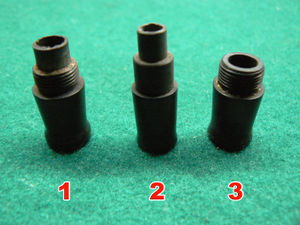Section
It's called "section" the final block of the tip of the pen, the one in which the nib and feeder are inserted. The figure shows the three most common types of section present on antique pens, corresponding to three different types of filling system; for more details on this type please refer to the page on "section and repair types". A further nomenclature related to the section is that of the so-called "nipple", present only on some types of section (in the figure types 1 and 2), used on pens whose filling system requires the presence of a sac, which is usually glued on the collar.
The section is present on almost all the fountain pens except for some particular designs like PFM, where the nib is directly inlaid on the section and]] then protrude, or as in the [[Parker T1 or the Pilot Murex where the nib is the continuation of the metal body. To these specific exceptions are added all the safety, which for construction mode do not have a section, being the nib retractable inside the body of the pen.
The section, in addition to be used to keep in contact nib and feeder, is also the most common grip point of the pen in the writing phase, and for this it generally presents a flared part that allows a more secure grip. In some cases, as in the Parker 75, this is also suitably worked or shaped with ergonomic shapes (triangular, in the case cited) to offer specific support surfaces for the fingers that facilitate the handle.
A parte questo, la sezione è in genere la parte della penna tradizionalmente meno soggetta di per sé ad innovazioni di carattere sia tecnico che stilistico, anche se esistono modelli particolari che presentano alcune caratteristiche specifiche come la citata Parker 75 con la ghiera per il posizionamento del pennino o la prima serie della Crest con la filettatura sulla cima della sezione stessa o le speciali sezioni con finestrella trasparente (il Visulated della Sheaffer) usate per rendere visibile il livello di inchiostro anche con penne dotate di un sistema di caricamento che in genere non lo consente (nel caso si trova ad esempio nelle Balance e nelle Doric con caricamento a levetta).
